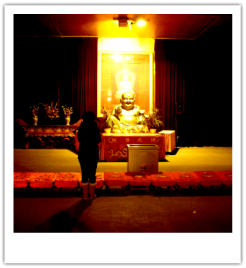 The moment you introduce the idea of power into any context, the potential for corruption and abuse is limitless. We may breathe air and live on bread, but we live in a world of numbers. Numbers are loaded with symbolism, and carry significance and power. They are often wielded to demand all kinds of preferential treatment and privileges by all sorts bodies and organisations that purport to represent people. Sometimes numbers are not always representational; we under estimate and over estimate things on a regular basis, and like stocks on the exchange, value can be relative to any one single day. I love the Towleroad blog for its round up of world news and gay issues. It recently reported that a fringe group in the US called 'One Million Moms', which one commentator on the site rightly noted would be more appropriately titled 'A few thousand women who can't count', attempted to start a viral campaign against JC Penny for what they deemed was the organisation's inappropriate use of Ellen DeGeneres as the brand spokesperson given that she was a lesbian and represented non Christian values. I know many gay people who consider themselves Christian, or Buddhist or Muslim and have no issue in maintaining their values despite how their religions may interpret their teachings or doctrines, good or bad. I think they have grown tired of always having to defend their own faith because of the way other people with similar religious inclinations interpret their own faith. And to JC Penny's credit, they stood by Ellen and ignored the threats of boycott if Ellen wasn't from her post. Despite that attempt, One Million Moms (their count, not mine) again have expressed outrage, staging an online campaign against Toys R Us for stocking an issue of the famous Archie comic series, whose recent issue depicted a same sex marriage celebration on its cover. Its one thing to ignore or choose not to purchase a product. It's a capitalist idea, and succinctly, the numbers will speak on their own behalf. Its another thing entirely to threaten mass boycotts. Social media is a powerful tool, one which can be increasingly exploited for good or bad. People power via the internet is fast defining this new decade and powerful (and not so powerful) lobby groups are setting the scene. Whilst to some extent these online petitions are a logical way in which people can create debate, express themselves and find comfort in like minded company, when they are used to curtail the hard won freedoms of other social groups I find them incredibly distasteful. Click on READ MORE to continue the post It's one thing to lobby against environmental or political injustice with the law and logic on your side, but to outright blackmail, sorry, I mean boycott organisations because of their acceptance and tolerance of different social groups, well I find that incredibly repugnant and disrespectful to the numbers game. After all, a minority may be a minority, but unequal only in number, not unequal at a human level.
And this is where we enter the numbers game. Generally, organisations like these fringe groups use numbers to substantiate and seek vindication for their arguments (in this case in their misnomer name), just like any petitioner would. The problem is, these splinter groups often take it upon themselves to try and replicate and represent the empirical and numeric power of their parental organisations, whether or not they are properly affiliated or even officially recognised. In the case of these Christian activist organisations, who claim to act on Christian values, the mere citing of the word Christian carries a powerful significance on the mere numbers alone that it conjures up. Statistical data suggests that there are at least 2.1 billion documented Christians on earth making Christianity the world's most represented faith. But, numbers can be misleading. Lets consider the 2.1 billion figure for a moment. These 2.1 billion people were all baptized at some point. From that day until the day they die, these people are considered Christian regardless of whether they continue to perceive themselves to be Christians or not. That is, they contribute to the overall total that make up the impressive 7 figure number, and affiliated organisations can then use these numbers as justification when demanding privileges, substantiating their claims to power or trying to influence policy, commerce and societal structure. I'm sure there are parallels in the world's other religious organisations because power breeds corruption and misuse, regardless of the context though because I am speaking from a Western perspective, I will stick with this example. As with any organisation endowed with this kind of power and this kind of representation, the potential for conflict and corruption is endless, and recently, increasingly well documented, but secondary to this argument. Returning to the numbers game, I would imagine at least a significant portion of these 2.1 billion people don't see themselves as being practicing Christians, and may not appreciate the idea that they are statistically contributing to the benefit of an organisation just like when you are part of a headcount on an organisation's mailing list and can be used for marketing or research purposes. Assuming these people went about debaptising themselves in the way that you would remove themselves from a mailing list, that is, removing themselves from the Christian records I would assume that the representational figure would be much, much lower than it currently is and a more accurate reflection of how the numbers really stack up. But, de-baptising yourself is not as easy as simply unsubscribing from a pesky mailing list. By some accounts it is either possible or not possible, difficult or burdensome, depending on where you are and who administers the records. Empirical data is just that. It's numbers that shape empires just like numbers shape political and social causes and allow us to order and deliver services. But the management of these numbers is critical, because without the management and correct control of these, we are simply maintaining empires that perhaps are not always indicative of the world we currently live in and thus, manipulating the axis between power and people.
2 Comments
Christina Milazzo
5/3/2012 06:20:53 am
My name is Christina Milazzo and I am a student at John Cabot University in Rome. I'm currently trying to begin conducting research for a project on the arts community in Testaccio. I came across your blog in trying to find information about the history of the neighborhood. So far, I've been coming up short on being able to break into the contemporary arts scene. If you'd be at all able to give me any helpful resources or contacts that would help me learn more about Testaccio, I would greatly appreciate it. Of course, if you have any information about the neighborhood or contemporary art in Rome on the whole that you could offer, I would greatly appreciate that as well. Hope this message wasn't too full of pretentiousness to defeat the hope of any reply, and that all is well.
Reply
Dave
15/3/2012 01:49:34 am
Hi Christina,
Reply
Your comment will be posted after it is approved.
Leave a Reply. |
Dave
|
|
|
Dave Di Vito is a writer, teacher and former curator.He's also the author of the Vinyl Tiger series and Replace The Sky.
For information about upcoming writing projects subscribe to the mailing list. Dave hates SPAM so he won't trouble you with any of his own. He promises. |




 RSS Feed
RSS Feed